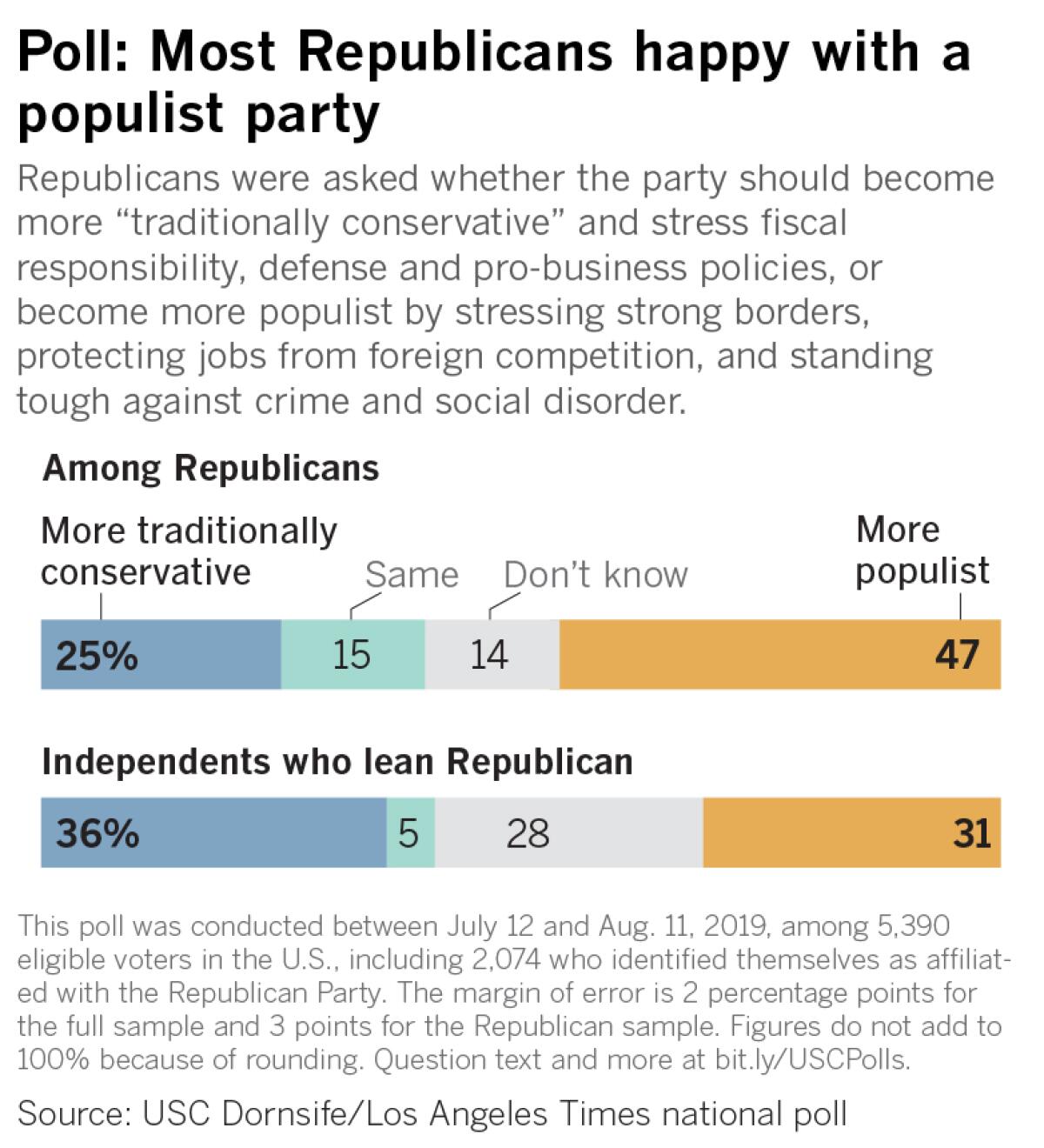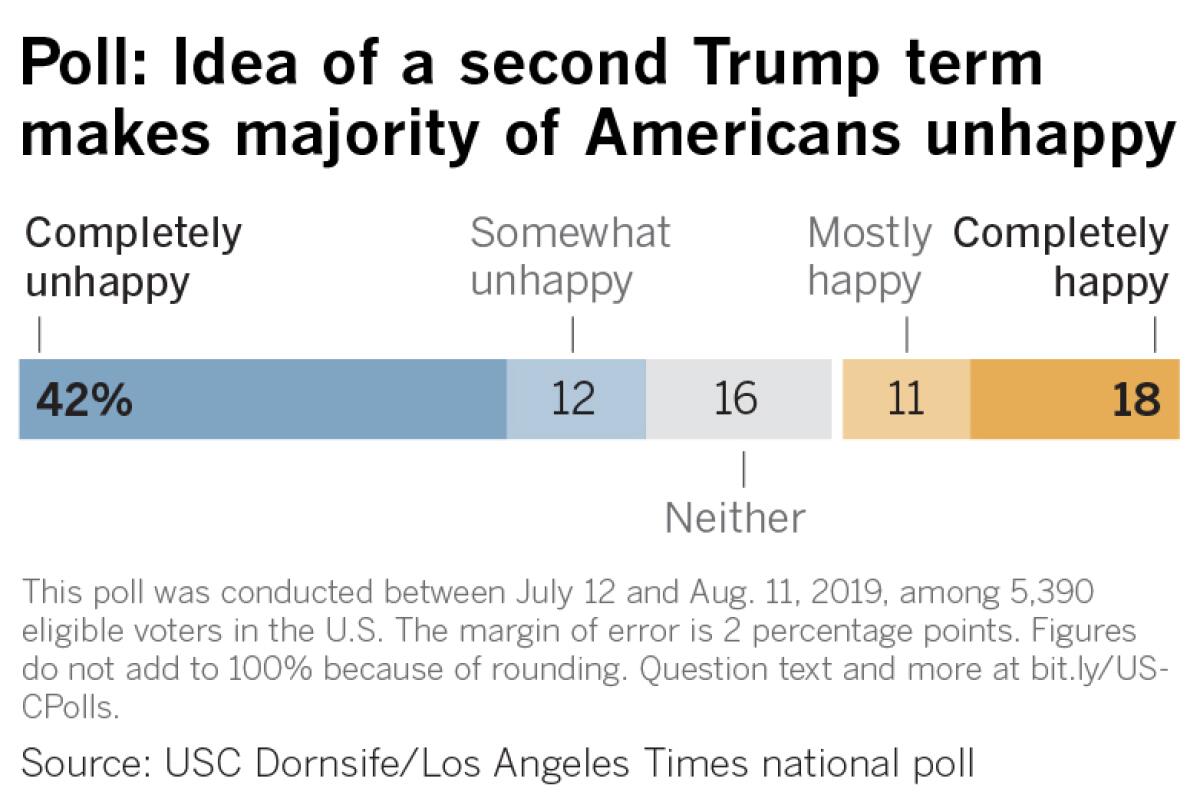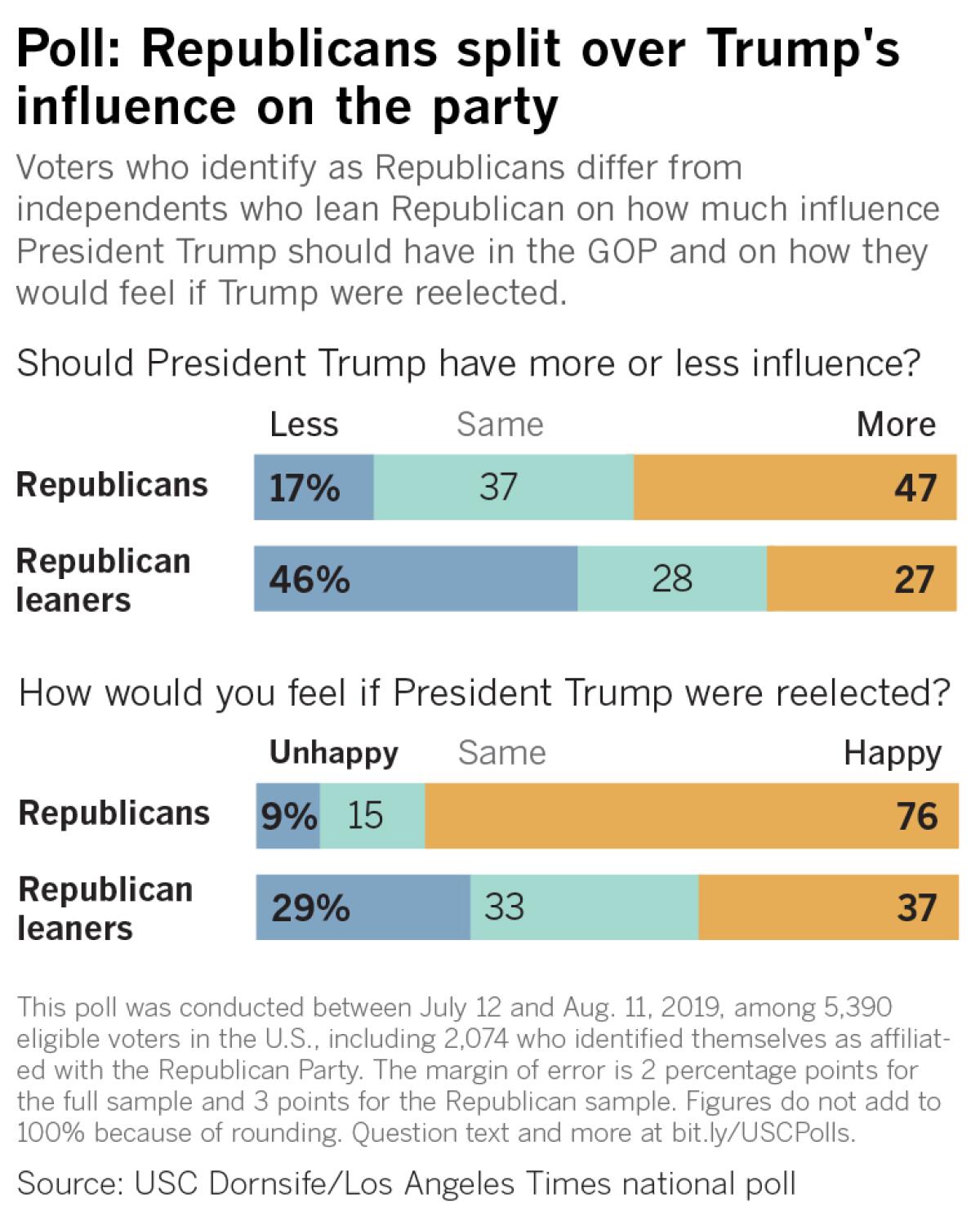Trump has remade the Republican Party, but at a price

- Share via
WASHINGTON — President Trump has remade the Republican Party in his populist image, but at a price that puts his reelection in jeopardy, a new USC Dornsife/Los Angeles Times poll finds.
Asked if the party should “become more populist, stressing issues like strong borders, protecting jobs from foreign competition and standing tough against crime and social disorder” or should “become more traditionally conservative, stressing fiscal responsibility, defense and pro-business policies,” more than four in 10 Republicans supported the populist side.
Only about a quarter of Republicans said they thought the party should move in the “more traditionally conservative” direction. Another 13% said the party should remain “largely the same as it is today.” The Republicans polled included people who said they aligned with the GOP and those who said they were independent or unaffiliated but leaned toward the party.
The poll’s findings illustrate the dominance Trump has achieved in the party that he conquered as an outsider in 2016. More than four in 10 Republicans said they would like Trump to have more influence in the GOP than he has now. Another third want him to have the same degree of influence. About two in 10 would like him to have less.
“It’s Trump’s party,” said Mike Murphy, the veteran Republican strategist and prominent Trump critic who co-directs USC’s Center for the Political Future.

Trump’s hold on the party’s voters has surprised and dismayed Republican elected officials who identify with the party’s traditional, business-oriented wing. Many of them initially believed they would be able to limit Trump on issues such as trade and immigration, only to discover that disagreeing with the president put their careers at risk.
Trump’s triumph, however, has come at the price of alienating a significant slice of the Republican electorate, the poll shows: Among Republicans, 12% said they would be unhappy to see him reelected.
The possibility of defections among Republicans is something Trump can ill afford: He won his election in 2016 by the slimmest of margins — roughly 80,000 votes in three key states out of some 130 million cast nationwide — and his policies have mobilized his opponents and driven away a large number of independent voters.
The poll illustrates the steep challenge that Trump faces in winning reelection: A majority of Americans eligible to vote would be unhappy if Trump were reelected, the survey finds. Of those polled, 54% said they would be unhappy, 29% happy, and 16% neither.
“Those are daunting numbers” for Trump, said Bob Shrum, the longtime Democratic strategist who is the USC center’s director.

That, of course, doesn’t forecast how the election will end up: Voting remains more than a year away and many Americans who say now that they would be unhappy to see Trump reelected could end up siding with him.
“Right now, it’s a referendum on Trump that he’s losing,” said Murphy. “The question is how it will look once it becomes a binary choice.”
Trump already has made clear that a big part of his campaign will aim to convince voters that even if they’re unhappy with him, the Democrats pose too risky a choice.
“Whether you love me or hate me, you have got to vote for me,” he said last week at a rally in Manchester, N.H., warning that Democrats would ruin the economy by raising taxes and adopting policies he described as “socialist.” The remarks came just after a sharp decline in the stock market that analysts largely attributed to investor fears over Trump’s trade war with China.
The poll findings show how he is starting the campaign with a deficit, said Jill Darling, the survey’s director.
Fearful of upsetting hardcore supporters while running for reelection, President Trump has backed away from new restrictions on gun sales while echoing the talking points of pro-gun activists.
More than 40% of those polled said they would be “completely unhappy” if Trump won, and fewer than 20% said they would be “completely happy,” underscoring the gap in intensity between his supporters and opponents. Among people younger than 45, 60% said they would be unhappy to see Trump win, and although he does better among older generations, even among those older than 65, about half said they would be unhappy.
Eight in 10 African Americans and two-thirds of Latinos said they would be unhappy with a Trump victory. White Americans split more closely, with 39% saying they would be happy and 45% unhappy.
Not surprisingly, Democrats overwhelmingly said they would be unhappy with a Trump reelection, 91% to 2%. Half of independents also said they would be unhappy, 15% said they would be happy and 35% answered neither.
Among Republicans who want the party to move back in a more traditional direction, about 20% said they would be unhappy to see Trump win, the poll found.
That group would provide an ideological base for an anti-Trump candidate in the Republican primaries. But any such challenge would be doomed to fail unless unexpected events overturned the strong support Trump gets from the large majority of Republicans.
The survey found a notable division between core Republican voters — the roughly 30% of the electorate who describe themselves as aligned with the GOP — and the smaller group of voters who described themselves as just leaning toward the party.
The Republican leaners were less supportive of populism, less in favor of Trump’s influence in the party and more unhappy about the prospect of his reelection than those who identified themselves as aligned with the GOP. They are also, on average, younger and more likely to be college educated than the core Republicans.
The two groups also differed on who they would like to see influence the party. Almost four in 10 Republican leaners, for example, would like to see evangelical Christian leaders have less influence. Only a quarter of core Republicans feel that way. Almost half the core GOP group would like to see Trump have more influence, while a similar number of the GOP leaners would prefer that he have less.
About 70% of the Republican leaners said they voted for Trump in 2016, but fewer than 40% said they would be happy to see him reelected. About 30% said they would be unhappy.

The lean-GOP group is only about 6% of the total electorate, but in an election in which the margin of victory may be only a point or two in key states, any significant defections among them could have a major impact.
The prospect of a Joe Biden presidency generated less intense reactions. About a third of those polled said they would be happy if the former vice president won, a third said they would be unhappy and a third were neutral.
Biden has been leading in polls of the Democratic race, although the contest remains fluid. This poll did not ask how people would react to a victory by other Democratic hopefuls.
Republicans do enter the campaign season more confident of victory than the Democrats. Republicans on average gave Trump a 74% chance of winning. Democrats gave their side a 59% chance.
The Democratic primary offers progressive voters a choice between two heroes of the left, Sens. Bernie Sanders of Vermont and Elizabeth Warren of Massachusetts.
In part, that reflects the continued impact of the 2016 election, in which Trump’s victory shocked many Democrats who believed Hillary Clinton would surely prevail, Shrum said.
But, he added, “Democrats are classically the sky-will-fall party. They worry, worry, worry.”
This USC Dornsife/Los Angeles Times poll was conducted from July 12 to Aug. 11 among 5,390 adult American citizens, including 2,074 who said they were aligned with or leaned toward the Republican Party. The margin of error is 2 percentage points in either direction for the full sample and 3 points for the Republican sub-sample.
Respondents were drawn from a probability-based panel maintained by USC’s Center for Economic and Social Research for its Understanding America Study. The poll was conducted in partnership with, and funded by, the USC Dornsife Center for the Political Future. Responses among all eligible voters were weighted to accurately reflect known demographics of the U.S. population. A description of the methodology, poll questions and data, and additional information about the poll are posted on the USC website.
More to Read
Get the L.A. Times Politics newsletter
Deeply reported insights into legislation, politics and policy from Sacramento, Washington and beyond. In your inbox three times per week.
You may occasionally receive promotional content from the Los Angeles Times.













